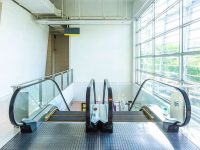Escalators are built to move people effortlessly, day in and day out. But like any machine, they don’t last forever. With constant wear, heavy foot traffic, and exposure to the elements, an escalator’s lifespan depends on maintenance, usage, and smart upgrades.
So, how long does an escalator really last? And more importantly, how can you extend its life without costly replacements?
How Long Do Escalators Really Last?
Most escalators have a lifespan of 20 to 30 years—but that’s just an estimate. Some last even longer with proper care, while others break down much sooner due to neglect or excessive strain.
Factors that influence longevity include:
- Daily traffic volume – High-traffic locations, like malls and transit hubs, wear out faster.
- Maintenance frequency – Regular servicing keeps components running smoothly.
- Environmental conditions – Outdoor escalators face additional wear from weather exposure.
A well-maintained escalator can outlive its expected lifespan. But ignoring maintenance? That’s a fast track to expensive repairs or premature replacement.
Neglected Maintenance = Costly Breakdowns
Escalators don’t fail overnight. Issues build up over time—loose chains, worn-out rollers, electrical problems. Ignoring small warning signs can lead to major failures, safety risks, and expensive emergency repairs.
- Skipping lubrication causes friction, increasing wear on moving parts.
- Delaying inspections allows minor issues to grow into full system failures.
- Worn steps, faulty sensors, or electrical failures can lead to unexpected shutdowns.
Preventive maintenance isn’t just about longevity—it’s about keeping your escalator safe, reliable, and operating efficiently.
Upgrades Can Extend Lifespan Without Full Replacement
Full escalator replacement is costly, but modernization offers a smarter alternative. Upgrading key components like drive systems, safety sensors, and lighting can improve efficiency, enhance reliability, and reduce maintenance needs.
Strategic upgrades keep your escalator running smoothly for years—without the expense of a full replacement.
Daily Best Practices to Keep Escalators Running Smoothly
Simple daily habits can make a big difference in escalator longevity.
- Keep the steps and handrails clean and free of debris to prevent mechanical strain.
- Ensure passengers follow safety guidelines—no excessive weight, no jumping, no blocking sensors.
- Schedule routine inspections to catch minor issues before they turn into big ones.
The smoother your escalator runs on a daily basis, the longer it will last—without surprise failures or costly downtime.
Extend Lifespan, Avoid Costly Replacements
Escalators are long-term investments, but their lifespan depends on how well they’re maintained. Regular servicing, smart upgrades, and daily best practices can add years to your system’s life while avoiding expensive replacements.
Take care of your escalator today, and it will keep moving people safely for decades to come.


